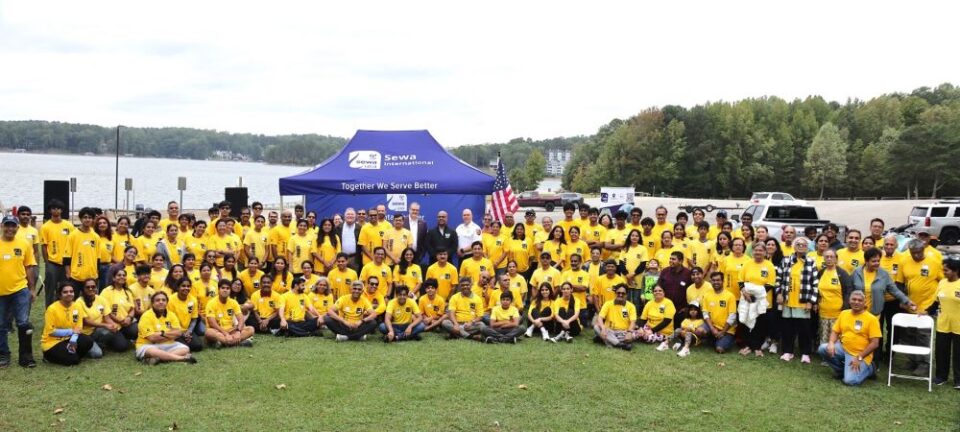BY JYOTHSNA HEGDE
Atlanta, GA, November 14, 2025: Early one Saturday morning in a rented community center in north Fulton County, the murmur of children’s voices drifts through the hallway. In one room, a dozen middle schoolers gather around laptops, a volunteer leans over to guide a reluctant reader through a paragraph; in another room, a small group practices violin, tentative but determined. Meanwhile, in a corner hall, elderly members of a senior club gather over chai and biscuits, exchanging stories of youth, migration, and homes long left behind.
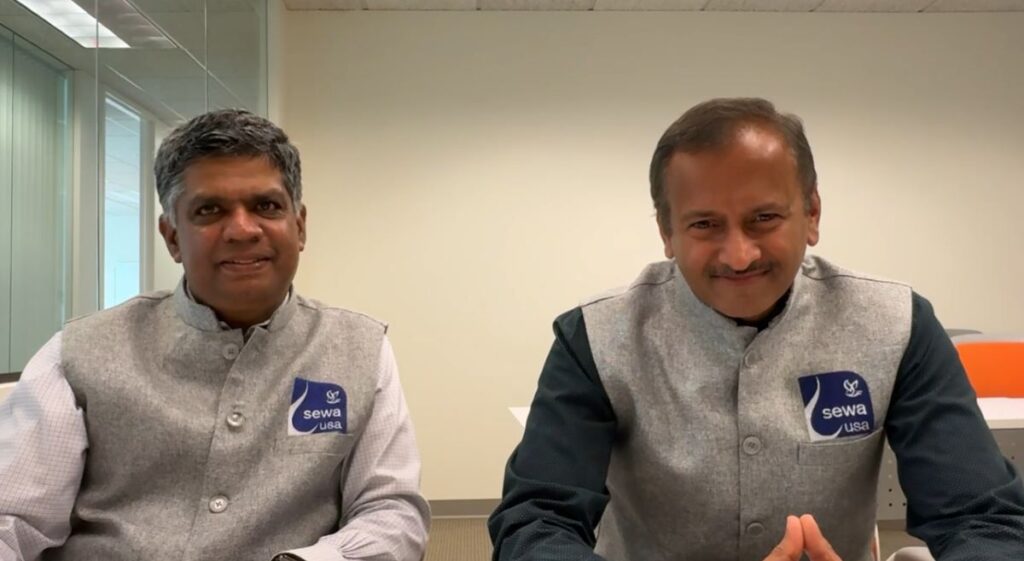
These disparate scenes the afterschool tutoring, the summer arts camp, the seniors’ gathering are threads in a tapestry woven by Sewa International’s Atlanta Chapter, an organization as humble in its daily rhythms as it is ambitious in its reach. Its volunteers, led by President Madhav Durbha and Vice President Raj Radhakrishnan, navigate the intersection of culture, community need, and selfless service. Their mission: to serve humanity in distress, uplift local communities, and catalyze transformational change “regardless of race, religion, gender, or nationality,” as they often say.
This is not charity; it’s compassion in motion. It’s about building bridges, sowing confidence, and stitching together a sense of belonging in a city of newcomers.
Origins, Philosophy, and the Atlanta Chapter Emergence
Sewa International in the U.S. was registered in 2003, but its ideological roots extend to India, where volunteer service movements grew from Hindu spiritual traditions of Vasudhaiva Kutumbakam, “the world is one family.” Over the years, Sewa expanded globally, responding to disasters, supporting underserved communities, and fostering development projects. Today, it operates across more than 40 U.S. cities and 20 countries worldwide.
“Sewa means service, selfless service,” explains Madhav Durbha, his tone calm and reflective. “Our guiding principle is simple: when someone is in need, we step up. It doesn’t matter who they are or where they come from. That is our dharma.”
When the Sewa footprint reached Atlanta, the local chapter adapted to the city’s particular challenges such as economic inequality, immigrant communities navigating new systems, and the need for grassroots health and education supports. Over time, this chapter built not just programs, but a living culture of volunteerism and humility.
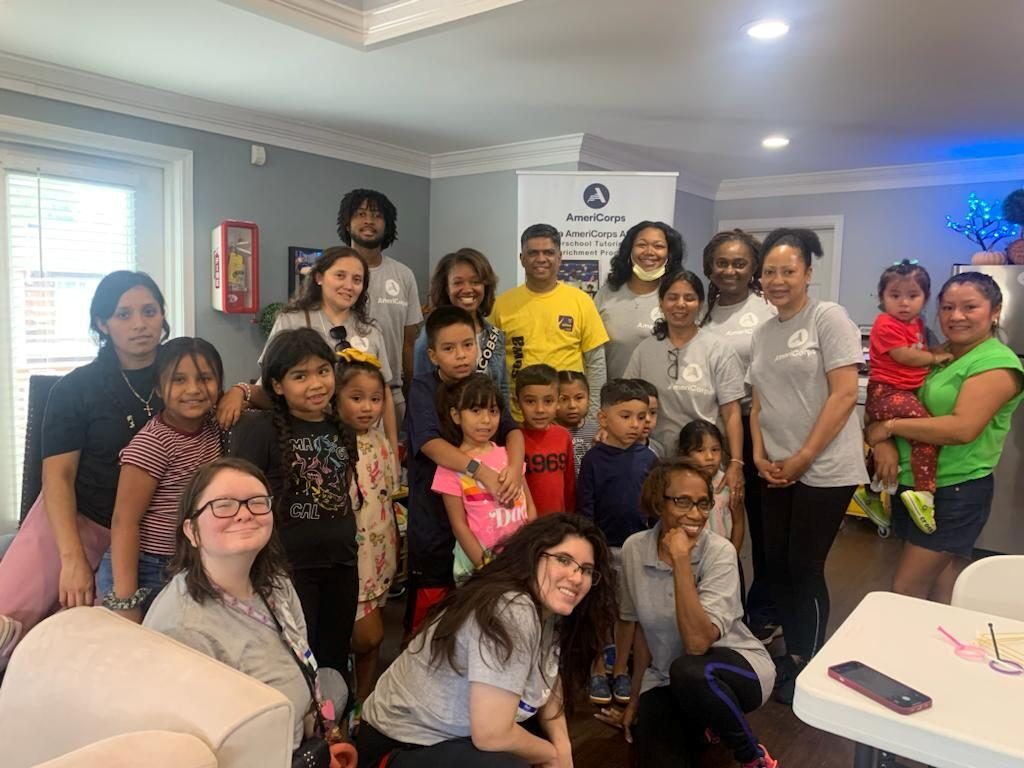
Tutoring, Enrichment, and Confidence Building
One of Sewa Atlanta’s flagship initiatives is its K–8 tutoring and enrichment program. Every week, 200 students log in or gather in small groups to receive homework help, tutoring, and enrichment sessions. Under Radhakrishnan’s leadership, the program has grown not just in numbers, but in its range of creative offerings.
“We tutor about 200 kids, K through 8,” says Raj Radhakrishnan. “Most are from underserved communities where parents might be working multiple jobs. Some don’t speak English at home. When a child finally turns in homework on time or reads a page fluently, the joy on their face is priceless. It’s more than academics, it’s confidence.”
What sets the program apart is the Saturday enrichment component. In a recent summer, Sewa piloted a camp for over 50 children, offering violin, ballet, art, and other exposures many had never encountered.
“Many of these kids had never seen a violin, let alone played one,” recalled Durbha. “By the end of camp, they were performing simple pieces. We also brought in a ballet teacher. To watch their eyes light up, to see them realize new possibilities, it was unforgettable.”
One girl, a shy fifth grader, held the violin awkwardly at first. But midway through the six-week camp, she stood before a small audience and played a few tentative notes. The room erupted in applause, not for perfection, but for bravery, for opening a new door. Parents, often balancing multiple jobs or language barriers, expressed astonishment at how their child’s world had expanded.
The tutoring program also doubles as a leadership incubator. High school students volunteer as tutors and role models, often staying involved for years. “We’ve seen our own volunteers grow through this work,” Radhakrishnan says. “They learn patience, empathy, leadership and earn the Presidential Volunteer Service Award along the way. It’s a ripple effect.”
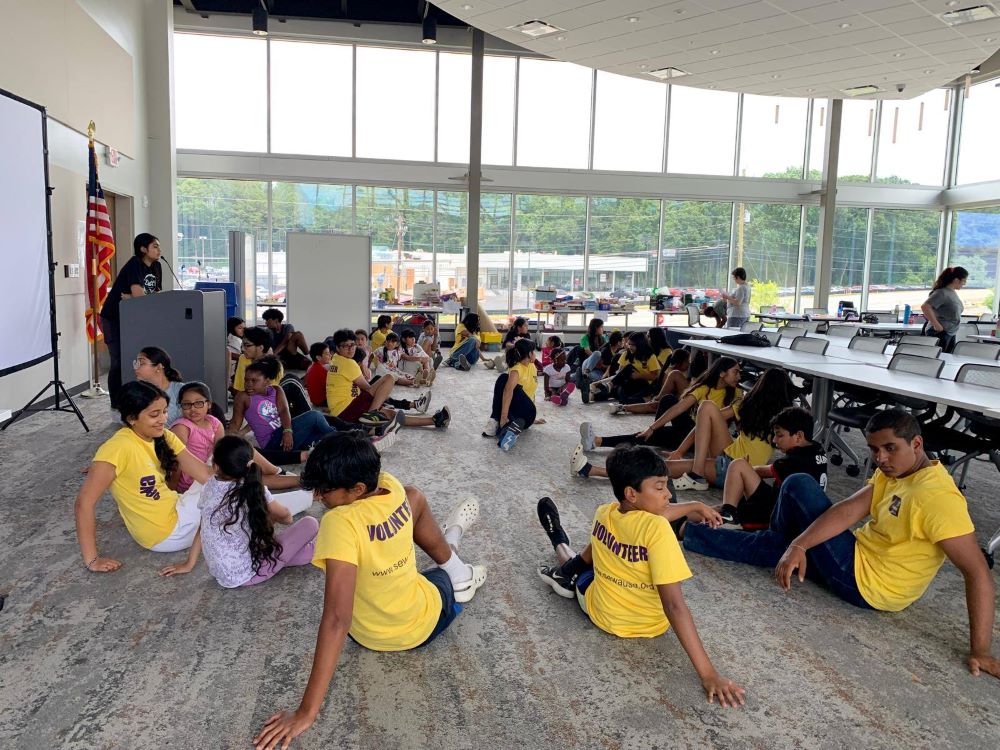
Overcoming Barriers: Technology, Trust, and Accountability
Launching online tutoring during the pandemic exposed hidden barriers. Many families had only a single shared device, usually a parent’s phone, that multiple children had to use. Engagement waned; dropouts increased.
“We realized many families had just one shared device, often a parent’s phone,” Durbha recalls. “We arranged Chromebooks via sponsors, and that completely changed engagement. Sometimes we forget how much we take access for granted.”
One instance stays vivid: a third grader trying to log on via a parent’s phone would lose visibility or drop off mid-session. After distributing Chromebooks, attendance surged, retention rose, and students began staying the course.
In the healthcare arena, building trust also required extra effort. Though Sewa’s clinics offered free care, some immigrant and Hispanic families hesitated. They feared hidden bills or questioned the legitimacy of a free clinic.
“Just because we offered free service didn’t mean people would come,” Radhakrishnan admits. “We had to build partnerships with community leaders. We visited churches, local associations, talked to pastors, and community elders. Gradually, trust formed.”
Beyond access and trust, logistical challenges lurked. Some patients couldn’t afford lab tests prescribed by the clinic. To bridge this, Sewa negotiated discounted lab rates with local partners and raised funds to cover costs for those who couldn’t pay.
“When the physician orders labs, it’s not just theory, patients have to get those labs done,” says Raj. “We supplemented cases where patients couldn’t pay. Without it, much of the clinic work would go to waste.”
To sustain these programs, Sewa launched an annual 5K fundraiser that draws hundreds of participants from all backgrounds. “The idea was to make it community-driven,” Durbha explains. “Every runner, every sponsor, helps us keep clinics running and children learning.”
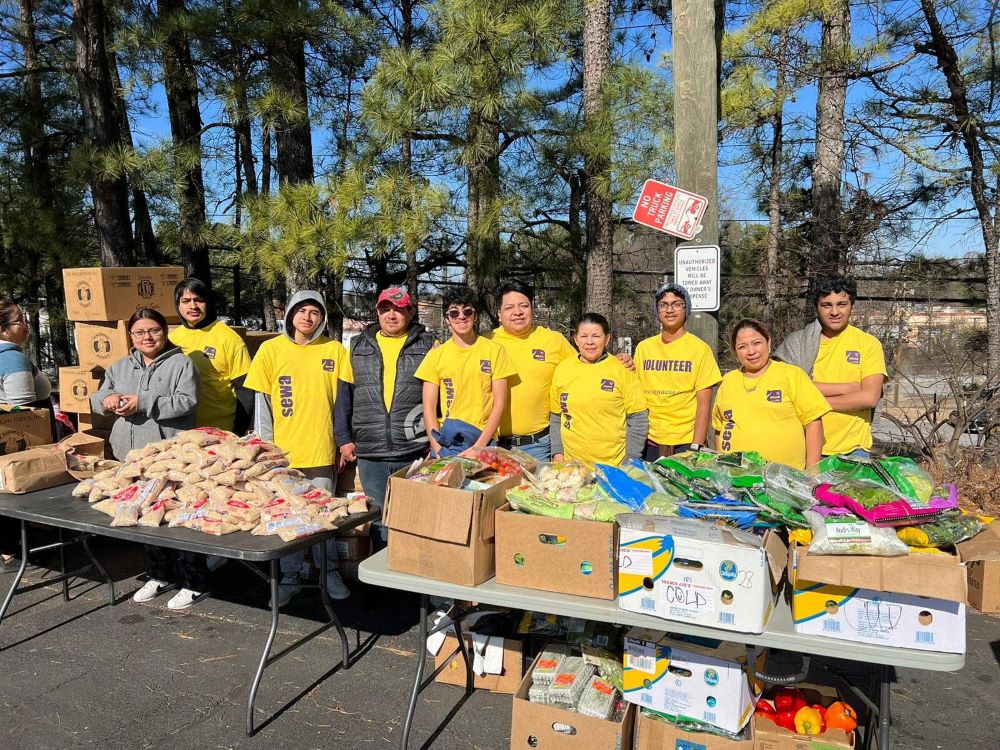
Food Security with Dignity
In a city where food deserts and income inequality persist, Sewa’s food programs aim to go deeper than charity. Volunteers partner with organizations like the Salvation Army to prepare and distribute sandwiches, while also supplying fresh produce, lentils, and beans, which are nutritious staples.
“We don’t want to hand out just canned goods,” says Radhakrishnan. “We focus on healthy items such as beans, lentils, fresh produce. The families we serve deserve food that sustains, not just fills.”
During the pandemic, when food insecurity reached crisis levels, Sewa Atlanta distributed thousands of meals across multiple neighborhoods. Volunteers, masked and distanced, worked through rain and heat, often spending entire weekends packaging groceries and coordinating delivery.
In one suburban neighborhood, a grandmother caring for grandchildren waited for the weekly food distribution. When given a sack of produce, she quietly whispered gratitude that she’d been skipping meals to feed the children. That small exchange, repeated countless times, reflects Sewa’s quiet philosophy: service not as pity, but as partnership.
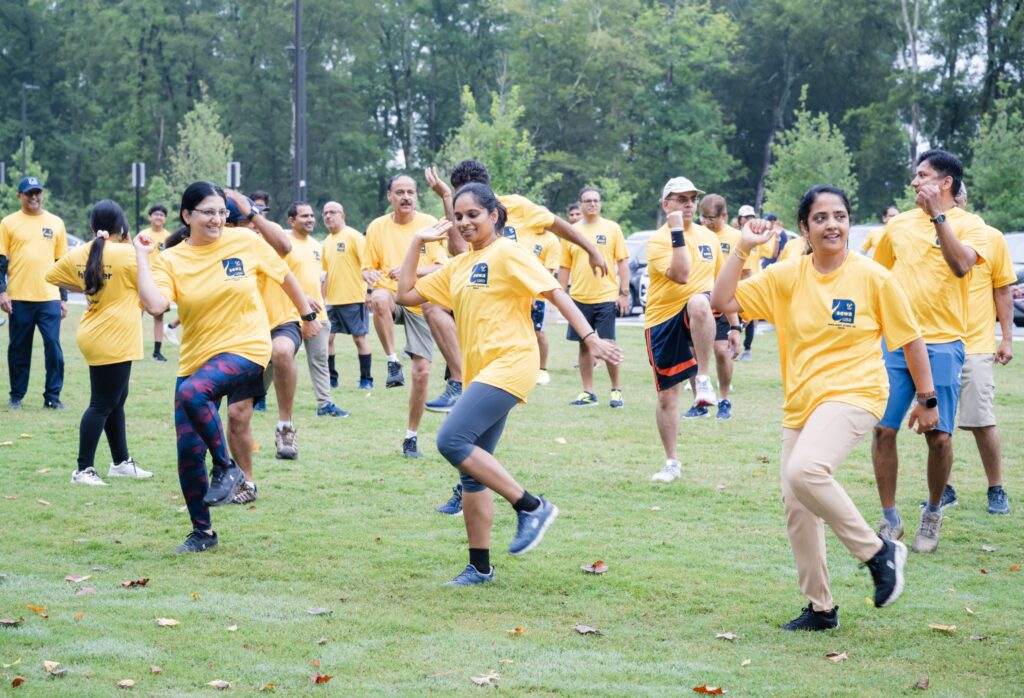
Health Clinics: Care, Compassion, Continuity
Sewa Atlanta’s twice-monthly free clinics, organized in partnership with the Georgia Association of Physicians of Indian Heritage, serve uninsured and underinsured residents, especially immigrants.
“Providing primary care and follow-up support, that is a real lifeline,” says Radhakrishnan. “We see families who’ve delayed care for years. We get them connected, and keep them connected.”
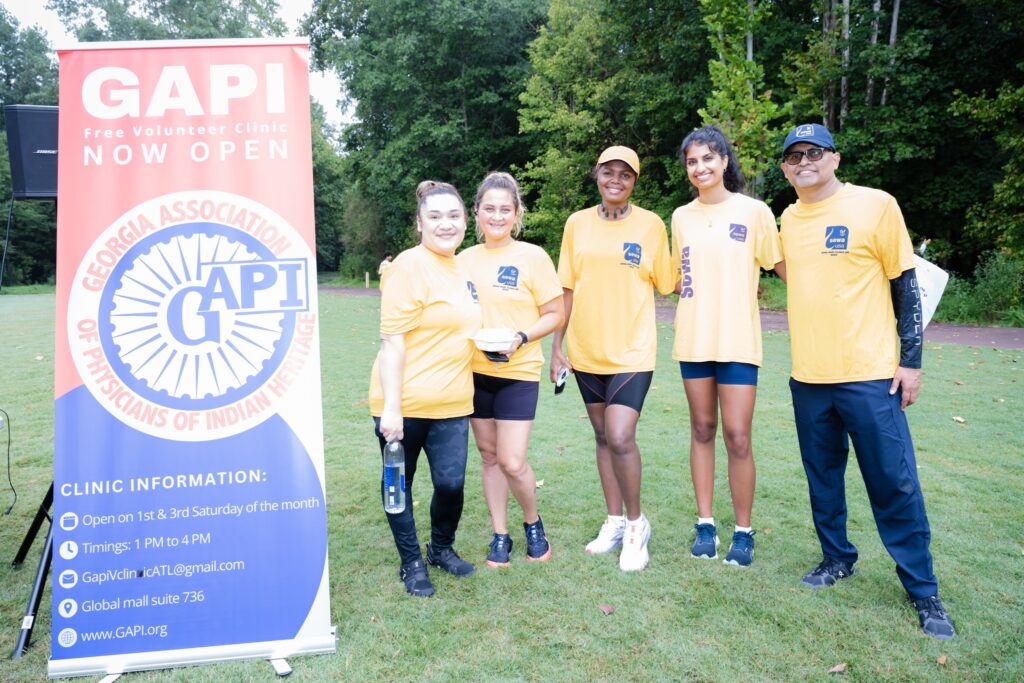
One patient, who had avoided doctors for years due to cost and fear, walked in with uncontrolled diabetes. His blood sugar was dangerously high. The doctors stabilized him, prescribed medication, and set him up for follow-up visits. Within months, his health improved dramatically.
“These are lives changed,” Durbha notes. “When you prevent complications and hospitalizations, you relieve human suffering and save in downstream costs. But most importantly, you restore dignity.”
What makes Sewa’s model distinct is continuity. Clinics follow up with patients, ensure lab results are reviewed, and coordinate referrals when needed. “Rehab and long-term care are the most difficult,” Raj reflects. “It’s easy to drop off after initial relief, but staying the course is what defines impact.”
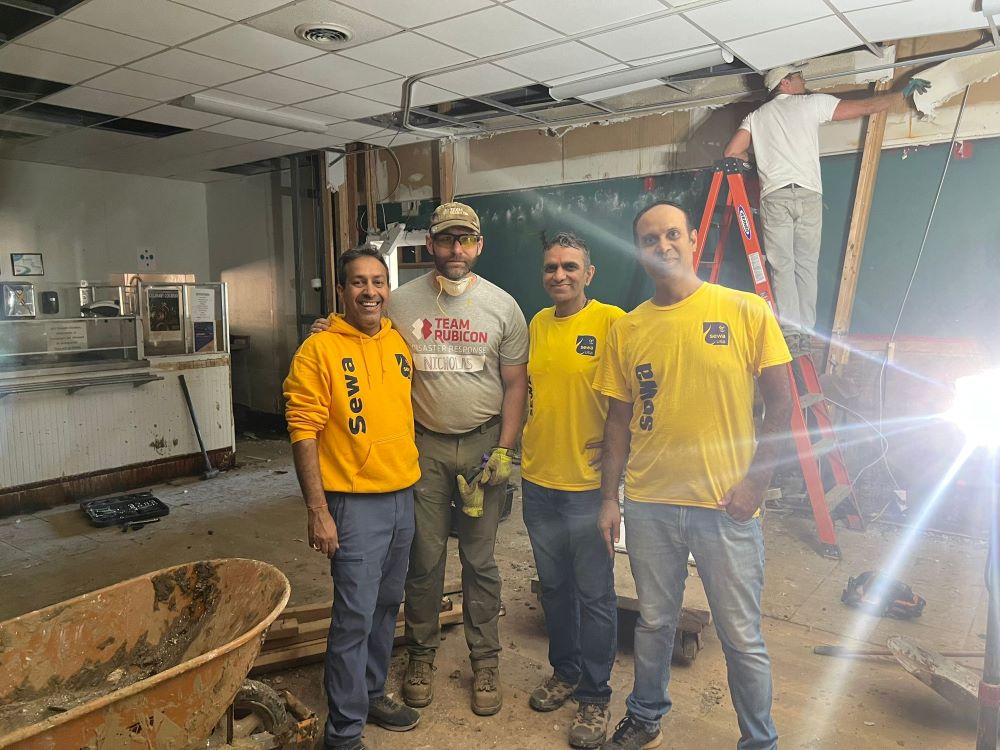
Volunteers: The Core That Powers It All
Sewa’s volunteers are the quiet current that powers everything. Hundreds show up for large events; a core of 20–30 sustain operations year-round.
“Volunteers are like electricity,” Durbha says. “You don’t notice them, but without them, nothing works.”
Many joined through moments of connection. During the pandemic, when Durbha’s wife, a physician, needed PPE, a Sewa volunteer arrived at their home with masks, no cost, no questions. “He said, ‘This is our way of thanking doctors,’” Durbha remembers. “That act moved me deeply. I started volunteering first through wellness webinars, then more deeply. Before long, Sewa became part of who I am.”
For Raj, it was a nudge from family. “Friends nudged me, and my wife said, ‘You’ve built business all these years; now it’s time to give back,’” he laughs. “At first, I said, ‘Okay, two hours a week.’ But seeing volunteers’ selflessness transformed me. Without Sewa, I wouldn’t truly understand what selfless service means.”
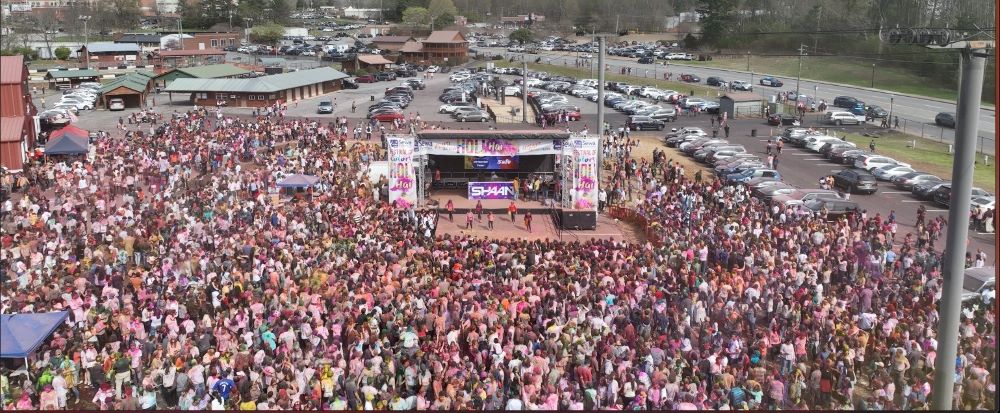
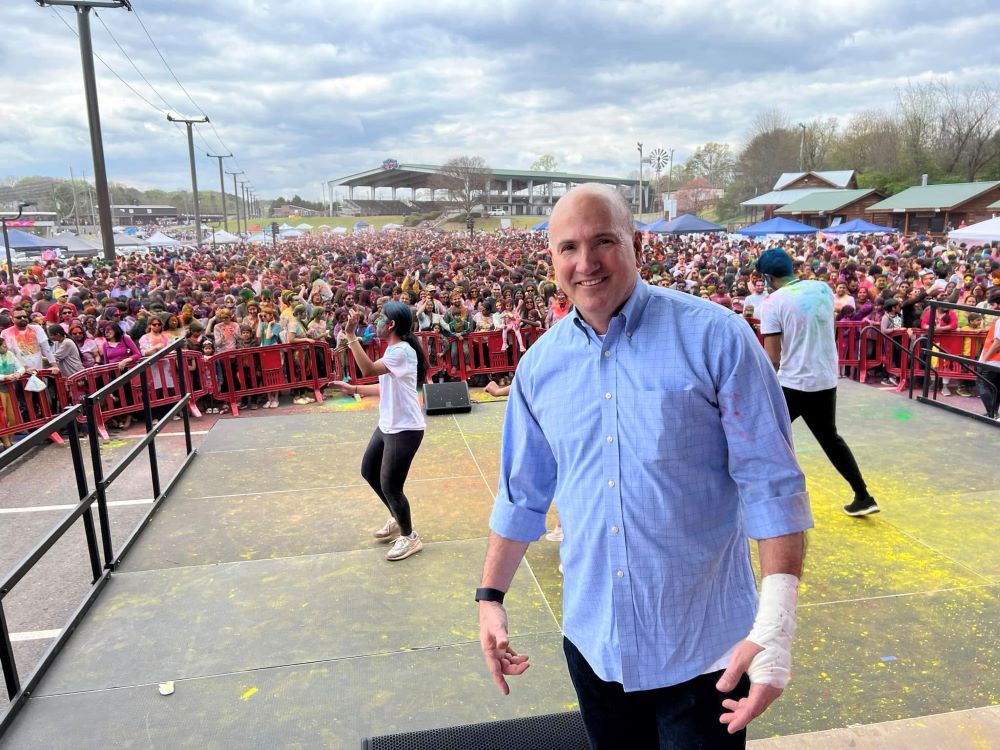
Culture, Community, and the Festival that Colors Lives
If Sewa’s tutoring and clinics nurture the mind and body, its Holi Festival nourishes the soul. Held every spring in Cumming, Georgia, the festival transforms a park into a carnival of colors, music, and joy.
“Holi might be a Hindu festival, but for us it’s about community,” says Raj. “When you’re covered in colors, differences disappear. People from all backgrounds come together.”
Corporate sponsors like Starbucks and Tesla have joined in recent years, recognizing the festival’s spirit of inclusion. The laughter, dance, and bursts of color embody Sewa’s ethos. “The beauty is symbolic,” Madhav reflects. “After colors fall, everyone looks the same, differences fade. That’s unity in diversity.”
For newcomers, Holi serves as a welcoming gateway. Many attendees later sign up as volunteers, inspired by Sewa’s work. In this way, celebration becomes connection, and connection becomes service.
Disaster Relief: When the World Calls
While Atlanta’s work is rooted locally, Sewa’s impact is global. The COVID-19 crisis in India was one such moment of connection.
“When India was hit by the second wave, the need for oxygen was overwhelming,” recalls Durbha. “Through connections, we located large stocks of oxygen concentrators in Alabama. By Saturday evening, they were in an Atlanta warehouse. By Sunday afternoon, UPS pledged to airlift them to India free of charge. Thousands of units reached hospitals quickly. That demonstrates what intent, network, and compassion can do.”
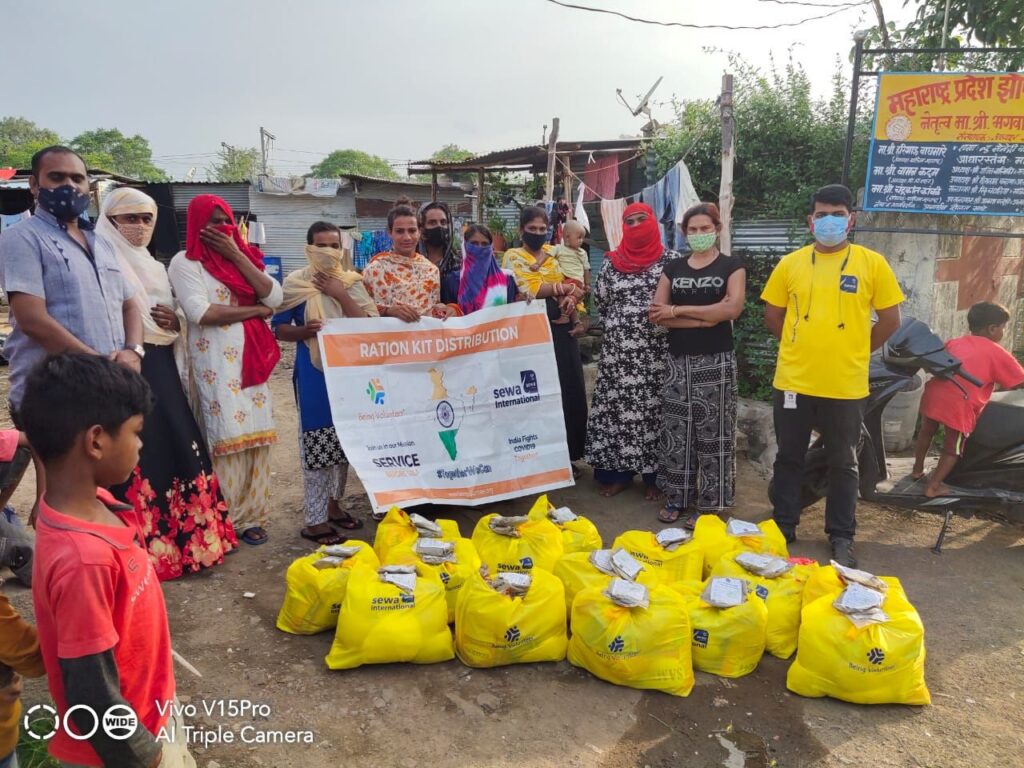
For Sewa volunteers, the experience reaffirmed their global mission. “It’s a reminder that small local actions ripple outward,” says Raj. “A local chapter helping supply oxygen half a world away, that’s scale through network.”
Sewa is also FEMA-registered. When hurricanes or wildfires strike within the U.S., the Atlanta chapter can deploy trained volunteers within hours. “Rehab is hardest,” Madhav adds. “It’s not enough to drop supplies. You need to stay, rebuild livelihoods, empower communities. That’s the Sewa difference.”
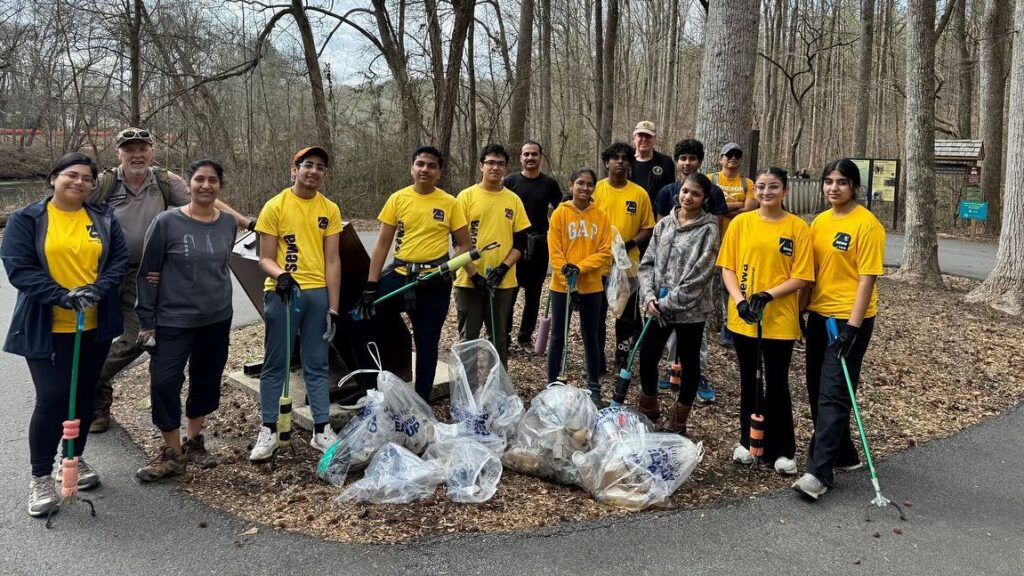
Growing Tomorrow’s Leaders
Sewa Atlanta’s LEAD program cultivates high school students into service-oriented leaders. Students volunteer in tutoring, health events, food drives, and global collaborations.
“In LEAD, students volunteer in local projects, learn context, see impact,” says Raj. “Some go on to leadership roles in Sewa, others carry service values wherever they go.”
One project paired U.S. students with children in Bangalore for English tutoring sessions. “At first, our students got frustrated with poor connectivity, scheduling issues,” Raj recalls. “Then they realized those kids were learning from tiny shacks, often on a parent’s phone. That awareness changed everything. They became patient, empathetic. By the end, they weren’t just teachers but friends.”
Madhav adds, “Service transforms both giver and receiver. Our students come in thinking they’re helping others, but they leave realizing how much they’ve grown themselves.”
Vision for the Next Decade
Looking ahead, Sewa Atlanta’s leaders envision expanding through partnerships and innovation. “We can’t solve every problem alone,” Madhav says. “The future is in ecosystems like nonprofits, government, corporations, and philanthropists coming together. Our role is convening, catalyzing, and contributing.”
Raj echoes the sentiment. “If our work inspires more volunteerism, whether through Sewa or other organizations, that’s success. Service becomes cultural, not transactional.”
Both leaders stress humility as non-negotiable. “We don’t seek spotlight,” Madhav insists. “We don’t want to be told we’re perfect. We want to keep listening, learning, and serving.”
Future initiatives may include mental health programs, legal aid for immigrants, and environmental clean-ups. “Service is dynamic,” says Durbha. “Needs evolve, and so must we.”
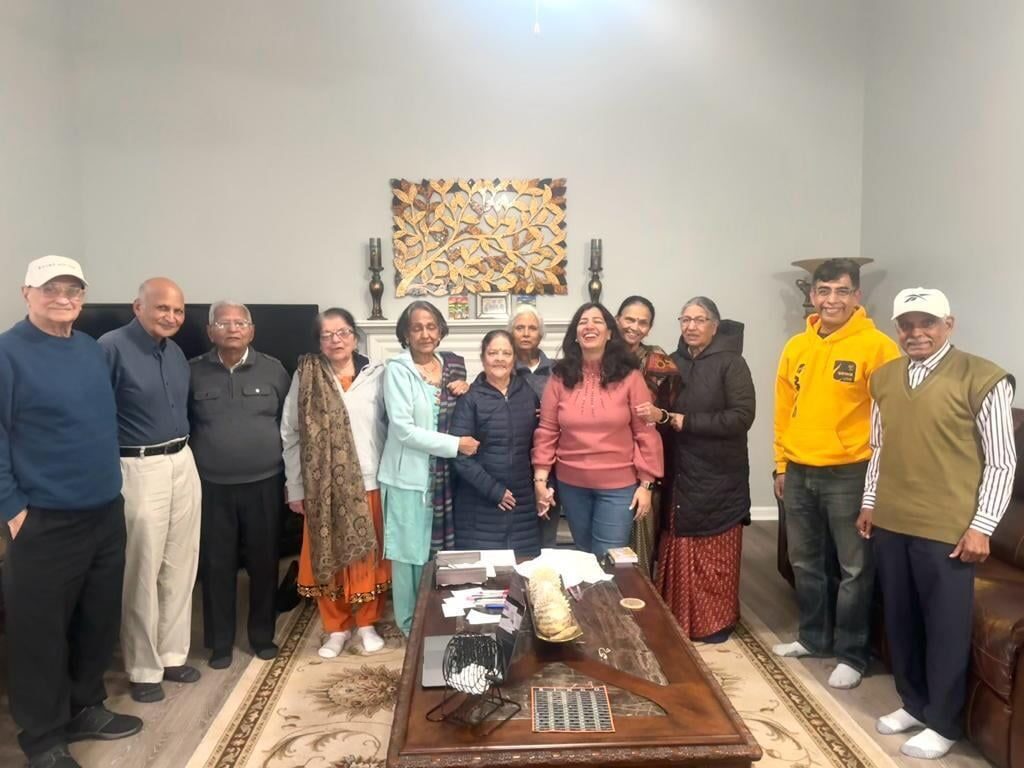
The Quiet Power of Sewa
Across Atlanta, from tutoring rooms and summer camps to clinics, food pantries, festivals, and disaster cargo planes, Sewa International’s work hums quietly but powerfully. It doesn’t seek headlines; it seeks transformation. It doesn’t ask who deserves help; it asks who needs it now.
In a world often divided by identity, Sewa’s message is profoundly simple: we belong together.
“When a child says, ‘I can do it,’ when a senior smiles, when a patient receives care, when volunteers discover purpose, that’s the music behind the movement,” says Durbha. “Sewa is not about charity. It’s about humanity. When we serve others, we also grow ourselves. That’s the true meaning of Sewa.”
Radhakrishnan nods in agreement. “If each of us just did a little bit every week, imagine what a city, what a country could become. That’s what Sewa is about. Not one big act, but thousands of small ones, done with heart.”
And perhaps that’s why Sewa International Atlanta stands out. In a time when headlines shout division, this quiet movement of compassion speaks volumes. It reminds Atlanta and the worldthat real service doesn’t demand recognition. It simply shows up, again and again, in the spirit of love, community, and hope.



